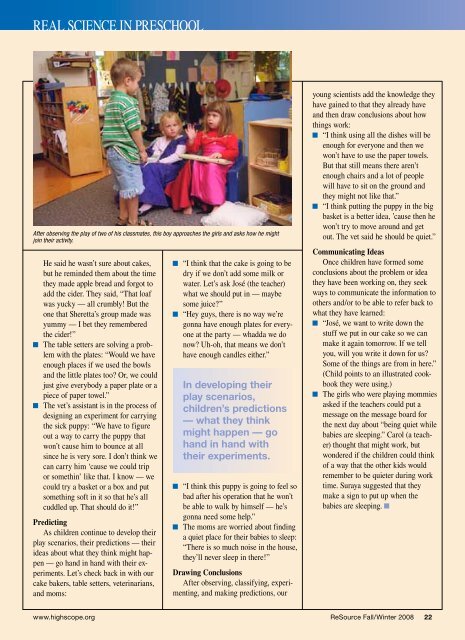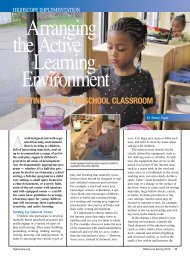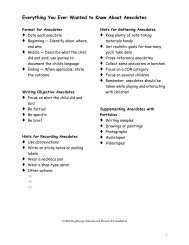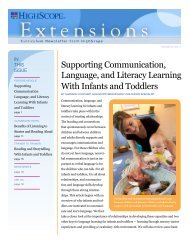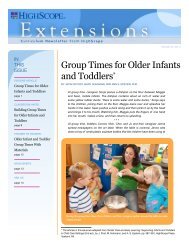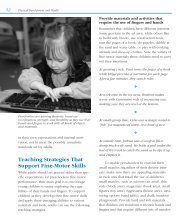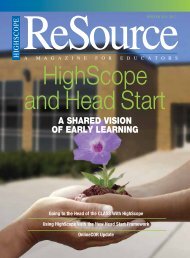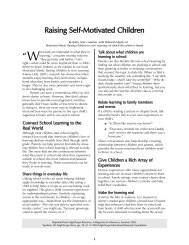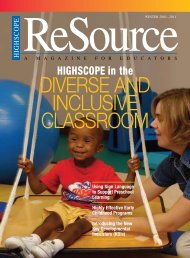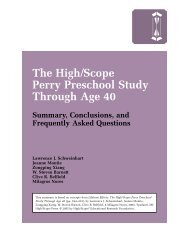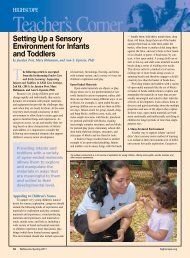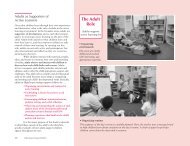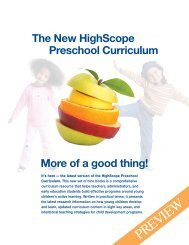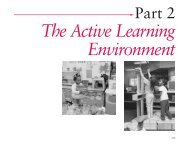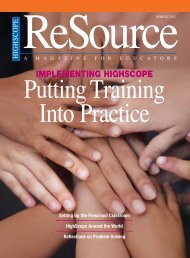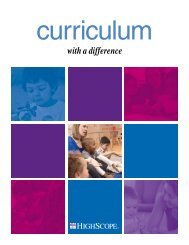Resource - High/scope In The Elementary Classroom
Resource - High/scope In The Elementary Classroom
Resource - High/scope In The Elementary Classroom
Create successful ePaper yourself
Turn your PDF publications into a flip-book with our unique Google optimized e-Paper software.
REAL SCiENCE iN PRESCHooL<br />
After observing the play of two of his classmates, this boy approaches the girls and asks how he might<br />
join their activity.<br />
He said he wasn’t sure about cakes,<br />
but he reminded them about the time<br />
they made apple bread and forgot to<br />
add the cider. <strong>The</strong>y said, “That loaf<br />
was yucky — all crumbly! But the<br />
one that Sheretta’s group made was<br />
yummy — i bet they remembered<br />
the cider!”<br />
<strong>The</strong> table setters are solving a problem<br />
with the plates: “Would we have<br />
enough places if we used the bowls<br />
and the little plates too? or, we could<br />
just give everybody a paper plate or a<br />
piece of paper towel.”<br />
<strong>The</strong> vet’s assistant is in the process of<br />
designing an experiment for carrying<br />
the sick puppy: “We have to figure<br />
out a way to carry the puppy that<br />
won’t cause him to bounce at all<br />
since he is very sore. i don’t think we<br />
can carry him ‘cause we could trip<br />
or somethin’ like that. i know — we<br />
could try a basket or a box and put<br />
something soft in it so that he’s all<br />
cuddled up. That should do it!”<br />
Predicting<br />
As children continue to develop their<br />
play scenarios, their predictions — their<br />
ideas about what they think might happen<br />
— go hand in hand with their experiments.<br />
Let’s check back in with our<br />
cake bakers, table setters, veterinarians,<br />
and moms:<br />
“i think that the cake is going to be<br />
dry if we don’t add some milk or<br />
water. Let’s ask José (the teacher)<br />
what we should put in — maybe<br />
some juice?”<br />
“Hey guys, there is no way we’re<br />
gonna have enough plates for everyone<br />
at the party — whadda we do<br />
now? Uh-oh, that means we don’t<br />
have enough candles either.”<br />
<strong>In</strong> developing their<br />
play scenarios,<br />
children’s predictions<br />
— what they think<br />
might happen — go<br />
hand in hand with<br />
their experiments.<br />
“i think this puppy is going to feel so<br />
bad after his operation that he won’t<br />
be able to walk by himself — he’s<br />
gonna need some help.”<br />
<strong>The</strong> moms are worried about finding<br />
a quiet place for their babies to sleep:<br />
“<strong>The</strong>re is so much noise in the house,<br />
they’ll never sleep in there!”<br />
Drawing Conclusions<br />
After observing, classifying, experimenting,<br />
and making predictions, our<br />
young scientists add the knowledge they<br />
have gained to that they already have<br />
and then draw conclusions about how<br />
things work:<br />
“i think using all the dishes will be<br />
enough for everyone and then we<br />
won’t have to use the paper towels.<br />
But that still means there aren’t<br />
enough chairs and a lot of people<br />
will have to sit on the ground and<br />
they might not like that.”<br />
“i think putting the puppy in the big<br />
basket is a better idea, ’cause then he<br />
won’t try to move around and get<br />
out. <strong>The</strong> vet said he should be quiet.”<br />
Communicating Ideas<br />
once children have formed some<br />
conclusions about the problem or idea<br />
they have been working on, they seek<br />
ways to communicate the information to<br />
others and/or to be able to refer back to<br />
what they have learned:<br />
“José, we want to write down the<br />
stuff we put in our cake so we can<br />
make it again tomorrow. if we tell<br />
you, will you write it down for us?<br />
Some of the things are from in here.”<br />
(Child points to an illustrated cookbook<br />
they were using.)<br />
<strong>The</strong> girls who were playing mommies<br />
asked if the teachers could put a<br />
message on the message board for<br />
the next day about “being quiet while<br />
babies are sleeping.” Carol (a teacher)<br />
thought that might work, but<br />
wondered if the children could think<br />
of a way that the other kids would<br />
remember to be quieter during work<br />
time. Suraya suggested that they<br />
make a sign to put up when the<br />
babies are sleeping.<br />
www.high<strong>scope</strong>.org ReSource Fall/Winter 2008 22


